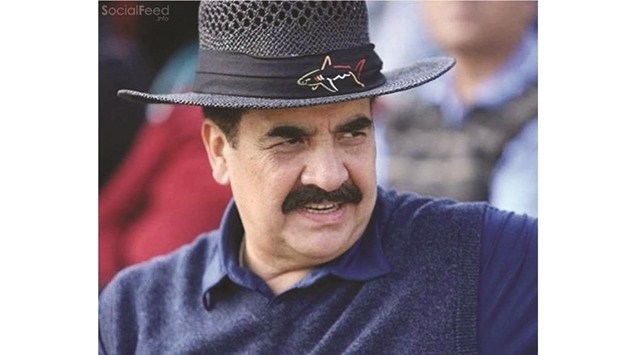General Raheel Sharif will have a bracketed affix from tomorrow, the one that signals career-end: retired. In hanging his uniform at the end of his three-year term, he has revived a tradition that ought to have been the standard but was tinkered with by his more power-hungry predecessors.
If the outgoing strongman deserves plaudits it is for something else: turning around Pakistan’s existential fight against terrorism and extremism with unrelenting commitment and dare, giving a weary nation credible hope of better tomorrows.
But his retirement or otherwise (read coerced or willing extension) remained the focus of the only entity that has an even larger-than-life footprint than the men in khakis - Pakistan’s chatterbox electronic media. That kind of shebang obviously takes its toll on the government and so it remained just as wary despite an early call from the General about stacking to the retirement plan.
In most democracies, the appointment and retirement of a military commander is a routine affair, not some national issue of the scale that would keep a fretting stakeholder or two up at night and, as a result, entail the kind of media circus it does in Pakistan. But then, the country has been ruled directly by the military for nearly half its existence and few, if ever, question the sweeping trajectory of its power even when it stays behind the constitutionally elected chief executive.
That the khaki chief announced the decision in January this year to retire on time - through the Director General Inter-Services Public Relations on Twitter - itself betrayed the extent of civil-military imbalance. It demonstrated his desire to go out on his terms, a legacy untouched by a civilian chief executive. Ideally, it would be the chief executive’s call signed by the president.
Gen. Sharif’s decision to exit the door on schedule has been welcomed by both the government and the opposition. Going by the more recent history, it would have been convenient for him to enjoy an encore on the basis of current form, and few among the critics would probably have even broken a sweat had the army chief been handed what has been a done deal in the country’s peculiar power matrix for the last two decades.
In keeping his word, Gen. Sharif breaks path from two of his immediate predecessors, who didn’t quite cover themselves in glory in securing extended terms that, in effect, brought Pakistan to a sorry pass, especially in the global war on terrorism. The incumbent has not only cleared the messy ground he inherited, but is also credited with setting desirable goals in pursuing the fight against terrorism.
The measure of success is evident not only in how the khakis blitzed militants and their hideouts in the badlands up north, but restoring peace to Karachi, the country’s economic lifeline, which enjoys the kind of normalcy today it has not seen in the last two-and-a-half decades. It gave birth to that famed Twitter hashtag - #ShukriaRaheelSharif (Thank you Raheel Sharif) - that is used by both his indulgent supporters and sarcastic detractors!
While there is still time to analyse his redoubtable contribution, the decision to hang up his boots offers several ponderables, none more compelling than the raison d’etre: Did he do it out of conviction premised in a rich family tradition (his brother laid down his life on the war front and is a recipient of Nishan-e-Haider, the highest gallantry award)? Was it a calculated decision after not getting favourable vibes from the civilian Sharif and growing unease that the extension issue may have compromised his declared mission of eliminating terrorism this year in Pakistan? May be a bit of both?
Some giveaways can be contextualised on the basis of performance and perception. The image of the army had eroded a great deal in the last years of General Pervez Musharraf - who was forced to resign under immense political pressure - and subsequently, under General Ashfaq Kayani, whose reluctance to launch a military operation in North Waziristan (the hotbed of militancy) and the shocking US raid that snared Osama bin Laden from near a premier military academy had brought the institution’s morale to an all-time low.
Musharraf benefited from two extensions - in all, three successive terms - that he gave himself after ousting the second-time elected government of Nawaz Sharif; and Kayani one - amounting to two full terms.
Gen. Sharif, on the other hand, arrived with a sense of direction and purpose. Even though he reportedly took a unilateral decision in pursuing the military operation Zarb-e-Azb - claims of the Sharif government notwithstanding - the rich dividends gave him a certain authority that would otherwise have been lacking.
The political downside for the civilian Sharif is that he has been largely walking in the shadows of the khaki Sharif since coming into power a third time in 2013 - something that rankles him no end. It is an open secret that the PM did not fancy giving his namesake the leeway to prolong his own ‘second fiddle’ agony. Perhaps, the General saved the PM his blushes by default in sticking to a ‘principled decision’!
Defence Minister Khawaja Asif, a confidante of the PM, had long been giving the media to believe that neither the issue of extension was under consideration nor was any such file on the PM’s table. Knowledgeable circles however, contend it had been more than a passing worry for the government, and Asif, sort of gave the game away in pointedly praising the army chief for “introducing a healthy trend in the country”.
Where the timely arrival of a new army chief - a decision the prime minister once again laboured over right until the end - has reinforced a desirable tradition, it has also raised the stakes for General Qamar Javed Bajwa to at least meet the benchmark set by the outgoing commander. Those are indeed big shoes to fill, not in the least, Gen. Sharif’s unfailing ability to strike a chord with popular sentiment thanks to action on the field and optics off it.
* The writer is Community Editor.

THE LAST STAND: General Raheel Sharif’s decision to retire on time, the first army chief to do so since 1996, has reinforced a desirable tradition.

